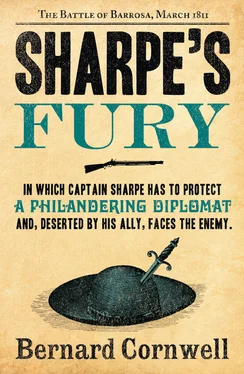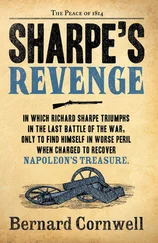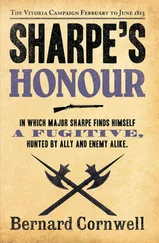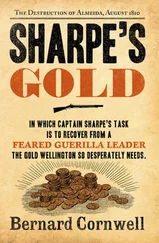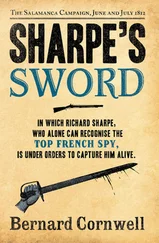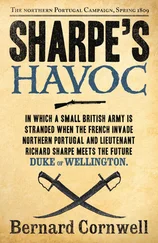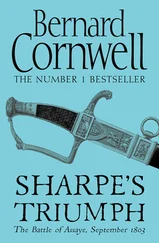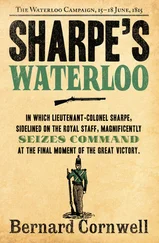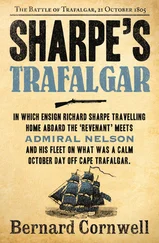All they had to do was show themselves. Not in ranks and files, but scattered across the hilltop so that they looked like partisans. The object was to make the French peer northwards and so ignore the attack creeping from the west.
‘That’s all we do?’ Harper asked. ‘We just piss around up here?’
‘More or less,’ Sharpe said. ‘Stand up, lads! Let the Crapauds see you!’ The light company was on the skyline, plainly visible, and there was just enough light to see that the French in Fort Joseph had registered their presence. Undoubtedly the garrison’s officers would be training their telescopes on the hill, but Sharpe’s men were in greatcoats so their uniforms, with their distinctive crossbelts, were not visible, and he had told them to take off their shakos so they did not look like soldiers.
‘Can we give them a shot or two?’ Harper asked.
‘Don’t want to get them excited,’ Sharpe said. ‘We just want them to watch us.’
‘But we can shoot when they wake up?’
‘When they see the others, yes. We’ll give them a greenjacket breakfast, eh?’
Sharpe’s company was unique in that while most of its men wore the red coats of the British infantry others were uniformed in the green jackets of the rifle battalions. It was all because of a mistake. Sharpe and his riflemen had been cut off from the retreat to Corunna, had made their way south to the forces in Lisbon and there been temporarily attached to the red-coated South Essex and somehow they had never left. The greenjackets carried rifles. To most people a rifle looked like a short musket, but the difference was hidden inside the barrel. The Baker rifle had seven grooves twisting the length of its barrel and those grooves gave the bullet a spin which made it lethally accurate. A musket was quick to load and fast to fire, but beyond sixty paces a man might as well shut his eyes rather than take aim. The rifle could kill at three times that range. The French had no rifles, which meant Sharpe’s greenjackets could lie on the hill, shoot at the defenders and know that none of the infantry inside Fort Joseph could answer their fire.
‘There they go,’ Harper said.
The five light companies were advancing up the hill. Their red uniforms looked black in the half-light. Some carried short ladders. They had a nasty job, Sharpe thought. The fort had a dry ditch and from the bottom of the ditch to the top of the parapet was at least ten feet and the top of the parapet was protected by sharpened stakes. The redcoats had to cross the ditch, place the ladders between the stakes and climb into the musket fire of the defenders. And, worse, face cannon fire as well. The French cannons were undoubtedly loaded, but with what? Round shot or canister? If it was canister then Moon’s troops could be hit hard by the first volley, while round shot would do much less damage. Not Sharpe’s problem. He walked along the hilltop, making sure he was silhouetted against the lightening sky, and miraculously the French were still oblivious of the four hundred men approaching from the west. ‘Go on, boys,’ Harper muttered, not speaking to all of the attacking troops, but to the light company of the 88th, the Connaught Rangers, an Irish regiment.
Sharpe was not watching. He had suddenly been seized by the superstition that if he watched the attack then it would fail. Instead he stared down at the river, counting the bridge’s pontoons, which were dark shadows in the mist that writhed just above the water. He decided he would count them and not look at Fort Joseph until the first shot was fired. Thirty-one, he reckoned, which meant there was one pontoon every ten feet for the river was just over a hundred yards wide. The pontoons were big, clumsy, square-ended barges across which a timber roadway had been laid. The winter had been wet all across southern Spain and Portugal and the Guadiana was running high and he could see the water seething where it broke on the pontoons’ bluff bows. Each boat had anchor chains running into the river and spring lines tensioned between the neighbouring barges across which the heavy baulks ran to support the chesses, the planks that made the roadway. It probably weighed over a hundred tons, Sharpe reckoned, and this job would not be over until that long bridge was destroyed.
‘They’re dozy bastards,’ Harper said in wonderment, presumably speaking of Fort Joseph’s defenders, but still Sharpe would not look. He was staring at Fort Josephine across the river where he could see men clustered about a cannon. They stepped away and the gun fired, belching a dirty smoke above the river’s thinning mist. It had fired a round of canister. The tin can, crammed with bullets, tore itself apart as it left the cannon’s muzzle and the half-inch balls whipped the air about Sharpe’s hilltop. The boom of the cannon rolled and echoed up the river valley. ‘Anyone hit?’ Sharpe called. No one answered.
The cannon’s fire only made the defenders of the nearer fort stare at the hill more intently. They were aiming one of their own cannon now, trying to elevate it so that the canister would scrape the skyline. ‘Keep your heads down,’ Sharpe said, then there was a dull rattle of musketry and he dared to look back at the attack.
It was almost over. There were redcoats in the ditch, more on ladders, and even as Sharpe watched he saw the redcoats surge over the parapet and carry bayonets at the blue-uniformed Frenchmen. There was no need of his rifles. ‘Get out of sight of that damned gun,’ he shouted, and his men hurried off the crest. A second cannon fired from the fort across the river and a musket ball plucked at the hem of Sharpe’s greatcoat and another drove up a flurry of dew from the grass by his side, but then he was off the hilltop and hidden from the distant gunners.
No gun fired from Fort Joseph. The garrison had been taken utterly by surprise and there were redcoats in the centre of the fort now, and a panicked stream of Frenchmen was running from the eastern gate to cross the bridge to the safety of Fort Josephine on the river’s Spanish bank. The musket fire was slowing. Maybe a dozen Frenchmen had been captured, the rest were fleeing, and there seemed to be scores of them running towards the bridge. The redcoats, screaming their war cries in the dawn, carried bayonets that encouraged the panicked flight. The French tricolour was hauled down before the last of the attacking troops had even crossed the ditch and wall. It had all been that quick.
‘Our job’s done,’ Sharpe said. ‘Down to the fort.’
‘That was easy,’ Lieutenant Jack Bullen said happily.
‘Not over yet, Jack.’
‘The bridge, you mean?’
‘Got to be destroyed.’
‘The hard bit’s done, anyway.’
‘That’s true,’ Sharpe said. He liked young Jack Bullen, a bluff Essex boy who was uncomplaining and hard-working. The men liked Bullen too. He treated them fairly, with the confidence that came from privilege, but it was a privilege that was always tempered by cheerfulness. A good officer, Sharpe reckoned.
They filed down the hill, across the rocky valley, over a small stream that fell cold from the hills and so up the next hill to the fort where the ladders were still propped against the parapet. Every now and then a petulant gun fired from Fort Josephine, but the balls were wasted against the earth-filled wicker baskets that topped the parapet. ‘Ah, you’re here, Sharpe,’ Brigadier Moon greeted him. He was suddenly affable, his dislike of Sharpe washed away by the elation of victory.
‘Congratulations, sir.’
‘What? Oh, thank you. That’s generous of you.’ Moon did seem touched by Sharpe’s praise. ‘It went better than I dared hope. There’s tea on the boil over there. Let your lads have some.’
The French prisoners were sitting in the fort’s centre. A dozen horses had been found in the stables and they were now being saddled, presumably because Moon, who had marched from the Tagus, reckoned he had earned the privilege of riding back. A captured officer was standing beside the well, disconsolately watching the victorious British troops who were gleefully searching the French packs captured in the barracks. ‘Fresh bread!’ Major Gillespie, one of Moon’s aides, tossed Sharpe a loaf. ‘Still warm. The bastards live well, don’t they?’
Читать дальше
